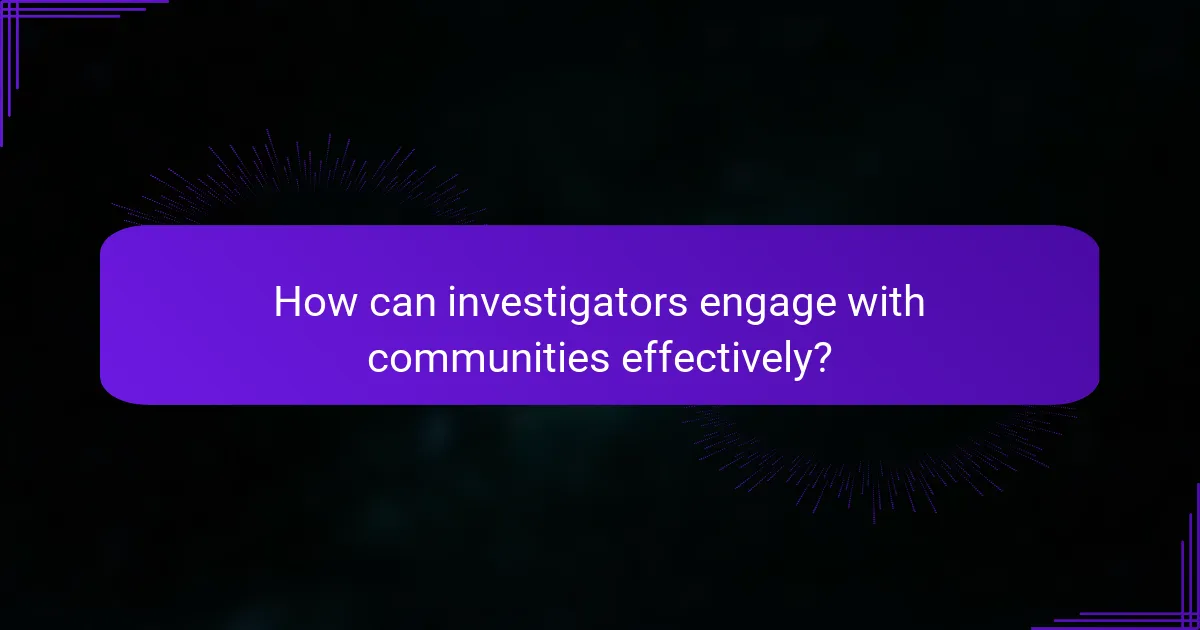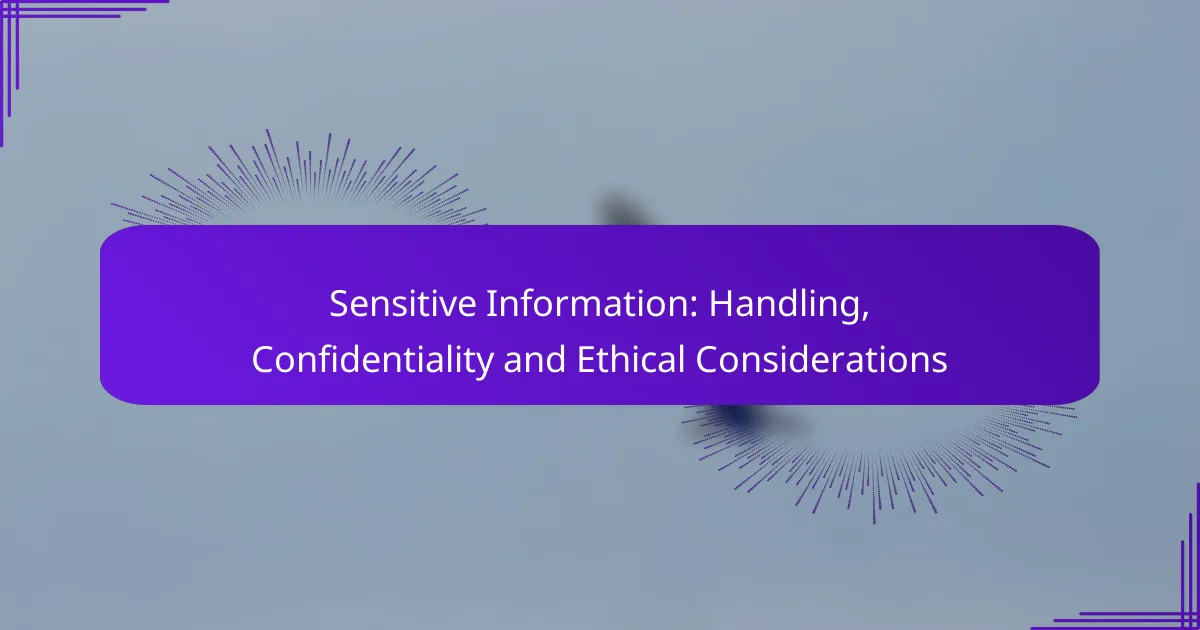Ethical guidelines for investigator conduct are crucial in ensuring research is carried out with integrity and respect for participants. By promoting transparency and fostering community engagement, these guidelines help build trust between researchers and the communities they serve, ultimately enhancing the quality and credibility of research outcomes.

What are the ethical guidelines for investigator conduct?
Ethical guidelines for investigator conduct ensure that research is conducted responsibly, with integrity and respect for participants. These guidelines promote transparency and accountability, fostering trust between researchers and the communities they serve.
Integrity in research practices
Integrity in research practices involves conducting studies honestly and reporting findings accurately. Investigators must avoid fabrication, falsification, and plagiarism, ensuring that their work is credible and reliable.
To maintain integrity, researchers should document their methodologies clearly and share data when possible. This transparency allows others to verify results and builds confidence in the research community.
Respect for participants’ rights
Respecting participants’ rights is fundamental in ethical research. Investigators must obtain informed consent, ensuring that participants understand the nature of the study and their rights to withdraw at any time without penalty.
Additionally, researchers should prioritize confidentiality and privacy, safeguarding personal information. This can involve anonymizing data and securely storing sensitive information to protect participants’ identities.
Adherence to regulatory standards
Adherence to regulatory standards is crucial for ethical investigator conduct. Researchers must comply with local and international regulations, such as the Declaration of Helsinki or the Common Rule in the United States, which outline ethical principles for research involving human subjects.
Investigators should stay informed about relevant laws and guidelines, including those specific to their field or location. Regular training and institutional review board (IRB) approvals are essential steps to ensure compliance and uphold ethical standards in research.

How can investigators engage with communities effectively?
Investigators can engage with communities effectively by prioritizing open communication, fostering trust, and involving community members in the research process. This approach not only enhances the quality of research but also ensures that the community feels valued and heard.
Building trust through transparency
Transparency is crucial for building trust between investigators and community members. By openly sharing research goals, methods, and potential impacts, investigators can create a sense of partnership. Regularly publishing updates and findings can further reinforce this trust.
Consider hosting public forums or community meetings where investigators can discuss their work and answer questions. This direct engagement helps demystify the research process and encourages community members to participate actively.
Involving community members in research design
Involving community members in the research design phase ensures that the study addresses their needs and concerns. This can be achieved through focus groups or surveys that solicit input on research questions and methodologies.
When community members feel their perspectives are valued, they are more likely to support and participate in the research. For instance, co-designing surveys or intervention strategies can lead to more relevant and impactful outcomes.
Providing feedback and updates to participants
Providing feedback and updates to participants is essential for maintaining engagement and accountability. After data collection, sharing preliminary findings with participants helps them understand the research’s relevance and impact.
Consider establishing a regular communication schedule, such as monthly newsletters or follow-up meetings, to keep participants informed. This practice not only respects their contribution but also encourages ongoing collaboration in future research efforts.

What role does transparency play in research ethics?
Transparency is essential in research ethics as it fosters trust and accountability among researchers, participants, and the broader community. By being open about research processes and findings, investigators can ensure ethical standards are upheld and that their work is credible and reproducible.
Open access to research findings
Open access to research findings allows anyone to access and review the results without financial barriers. This practice promotes wider dissemination of knowledge and encourages collaboration among researchers. For example, publishing in open-access journals can significantly increase the visibility and impact of research.
Researchers should consider using platforms that support open access, such as institutional repositories or dedicated open-access journals. This approach not only enhances the reach of their work but also aligns with ethical guidelines promoting public access to scientific knowledge.
Clear communication of research purposes
Clear communication of research purposes ensures that all stakeholders understand the goals and significance of the study. This clarity helps participants make informed decisions about their involvement and fosters trust in the research process. Researchers should articulate their objectives in layman’s terms to reach a broader audience.
When drafting consent forms or informational materials, use straightforward language and avoid jargon. Providing a summary of the research aims and potential impacts can help participants feel more engaged and informed about their contributions.
Disclosure of funding sources
Disclosure of funding sources is critical for maintaining transparency and addressing potential conflicts of interest. Researchers should openly share who funded their work, as this information can influence public perception and trust. Funding disclosures can also help identify any biases that may affect research outcomes.
When reporting results, include a statement about funding sources in publications and presentations. This practice not only adheres to ethical standards but also enhances the credibility of the research by demonstrating accountability and integrity in the funding process.

What are the best practices for ethical investigator conduct?
Best practices for ethical investigator conduct include adhering to established ethical standards, maintaining transparency, and engaging with the community. These practices ensure that research is conducted responsibly and with respect for all stakeholders involved.
Regular training on ethical standards
Regular training on ethical standards is crucial for investigators to stay informed about current guidelines and best practices. This training should cover topics such as informed consent, participant rights, and data integrity.
Institutions can implement annual workshops or online courses to reinforce ethical principles. Engaging with real-world case studies can help investigators understand the implications of ethical breaches.
Implementing conflict of interest policies
Implementing conflict of interest policies is essential to maintain the integrity of research. Investigators must disclose any personal or financial interests that could influence their work, ensuring transparency in the research process.
Clear guidelines should be established to identify potential conflicts and outline steps for managing them. Regular audits can help ensure compliance and address any issues that arise.
Conducting ethical reviews
Conducting ethical reviews is a key step in the research process, ensuring that studies meet ethical standards before they begin. Institutional Review Boards (IRBs) or Ethics Committees typically oversee these reviews, evaluating the potential risks and benefits of proposed research.
Investigators should prepare comprehensive proposals that detail their methodologies, participant recruitment strategies, and data management plans. Engaging with the review process can help identify ethical concerns early and facilitate smoother project approval.

What frameworks support ethical community engagement?
Ethical community engagement is supported by frameworks that prioritize transparency, collaboration, and respect for community input. These frameworks help ensure that research and initiatives are conducted in a manner that is beneficial and respectful to the communities involved.
Community advisory boards
Community advisory boards (CABs) are groups formed to provide guidance and feedback on research projects or initiatives that affect their community. They typically consist of community members who represent diverse perspectives and interests, ensuring that the voices of those impacted are heard.
To establish an effective CAB, researchers should recruit members who are knowledgeable about the community and its needs. Regular meetings should be scheduled to facilitate open dialogue, and feedback should be actively sought and incorporated into project planning. This approach fosters trust and enhances the relevance of the research.
Participatory research methods
Participatory research methods involve engaging community members as active participants in the research process rather than as passive subjects. This approach can include co-designing studies, collecting data, and analyzing results together, which empowers communities and enhances the validity of findings.
When implementing participatory methods, it is crucial to ensure that all participants understand their roles and the research objectives. Researchers should provide training and resources to support community involvement. Additionally, maintaining clear communication throughout the process helps build relationships and ensures that the research addresses community priorities effectively.

How can transparency be measured in research?
Transparency in research can be measured through various metrics that assess the openness of data sharing, participant engagement, and the clarity of communication regarding research processes. Key indicators include the availability of data sets, participant feedback, and adherence to ethical guidelines.
Metrics for open data sharing
Open data sharing can be evaluated using metrics such as the percentage of datasets made publicly available, the ease of access to these datasets, and the clarity of documentation accompanying the data. For instance, research institutions may aim for at least 70% of their datasets to be accessible within a year of project completion.
Additionally, tracking the number of citations or downloads of shared data can provide insights into its utility and impact. Implementing standardized formats for data sharing can further enhance transparency and facilitate comparisons across studies.
Surveys on participant satisfaction
Surveys measuring participant satisfaction can serve as a crucial tool for assessing transparency in research. These surveys should focus on participants’ understanding of the study’s purpose, their rights, and how their data will be used. Aiming for a response rate of at least 60% can yield meaningful insights.
Common questions might include participants’ perceptions of informed consent processes and their overall experience. Analyzing feedback can help researchers identify areas for improvement and ensure that ethical standards are upheld throughout the research process.



